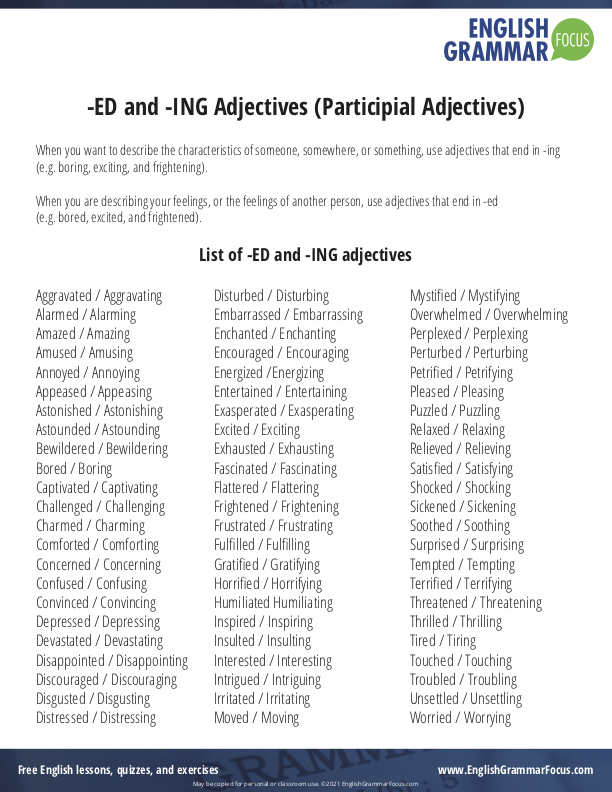Don’t make these mistakes when using -ed and -ing adjectives (Free Download)
SHARE THIS:
Ready for the quiz?
Test your knowledge by taking the quiz. Try to get 10 out of 10 correct to become a grammar superstar!
In this lesson I will show you how to avoid common mistakes when using adjectives that end in -ed and -ing.
If you are not sure when you should use bored or boring, or interested or interesting, this is for you. By the end of this lesson, you will know the difference between these pairs of adjectives, and you will be able to use them correctly.
I’ll also cover some of the most common mistakes, and don’t forget to take my short quiz to test your understanding.
Adjectives – a quick review
Let’s start with a quick review. Adjectives describe nouns or pronouns. They tell us more about people, places, things, or ideas.
Adjectives can go before the noun, like in the sentence:
Joe bought a new car.
Or they can go after the noun, as in:
The car is new.
In both examples, “new” is the adjective and it describes a thing, the car.


ED and ING adjectives
In this lesson, we are going to focus on certain pairs of adjectives. Many of these adjectives are made by adding the suffixes -ed or -ing to the end of a verb.
For example we can add -ed and -ing to the end of the verb “bore” to make the adjectives “bored” and “boring.”
We can add the same suffixes to the verb “relax” to make the adjectives “relaxed” and “relaxing”.
You are probably familiar with these words, but do you use them correctly? Let’s find out.
Adjectives ending in -ing
Adjectives that end in -ing tell you about someone, somewhere, or something. They describe the quality or characteristics of the noun. Let’s look at some examples.
Peter’s job is boring.
The adjective boring describes Peter’s job.
The book was surprising.
The adjective surprising describes the book, or maybe how the story ended.
This has been an exhausting workout.
The adjective exhausting describes the workout.
When you want to describe the characteristics of something, use adjectives that end in -ing, like boring, exciting, and frightening.
Adjectives ending in -ed
Adjectives that end in -ed are different. They describe reactions, emotions, or how somebody feels about something. Here are some examples.
Peter is bored because he always does the same thing at work.
If you do the same thing at work every day, it will cause you to feel bored.
I was so surprised because I didn’t think the book would end that way.
Maybe you thought that the book would have a sad ending, but it had a happy ending. It caused you to feel surprised.
Sara feels exhausted because she has been running for two hours.
If you run for two hours, you will probably feel exhausted.
When you are describing your feelings, or the feelings of another person, use adjectives that end in “ed”. Like bored, excited, and frightened,
Don’t make these common mistakes!
Tip #1 – past, present, or future?
One common mistake is to think that adjectives that end in -ed are only used to describe things in the past, and adjectives that end -ing are used to describe things in the present.
Even though these adjectives look like verbs, it’s important to remember that adjectives that end in -ed and -ing can be used in any tense, past, present, or future.
Examples of adjectives that end in -ed in different tenses
He was surprised yesterday. (past)
He is surprised. (present)
He will be surprised tomorrow. (future)
Examples of adjectives that end in -ing in different tenses
I had a relaxing weekend. (past)
This is such a relaxing weekend. (present)
I’m going to have a relaxing weekend. (future)
Tip #3 – Using -ing adjectives to describe people
We learned that adjectives that end in -ed can describe people’s feelings. Adjectives that end in -ing can be used to describe the characteristics of things and people, including yourself, but the meaning is completely different.
Think about the difference between these two sentences:
Joe is bored. Peter is boring.
Who has nothing to do? Who makes other people feel bored?
The first sentence “Joe is bored.” describes how Joe feels. Maybe he finished all of his work early today, and he is just sitting at his desk, waiting to go home.
The second sentence, “Peter is boring.” describes how Peter makes other people feel. When you meet Peter, you feel bored, maybe he always talks about work, and he never has any fun.
Tip #3 – Pronunciation of ED
The pronunciation of adjectives that end in -ed can be confusing because the suffix -ed can make more than one sound. If you want to know how to pronounce these adjectives correctly, read my article on how to pronounce -ed in regular verbs. The rules are exactly the same.
Conclusion
As you can see, there is a big difference between adjectives that end in -ed and -ing. Using these correctly will help you to avoid confusion, and you’ll be able to communicate more like a native speaker.
The most important thing is to practice using these words, and don’t worry too much about making mistakes. Even if you use the wrong form of the adjective, most people will understand what you are trying to say.
When you are ready, I have another challenge for you. Take the -ed and -ing adjectives quiz, and share your results with me of Facebook and Twitter. Try to get all of the answers correct to earn the title of grammar superstar.
If you have any questions about anything that I covered about today? Let me know in the comments below.
Ready for the quiz?
Test your knowledge by taking the quiz. Try to get 10 out of 10 correct to become a grammar superstar!


